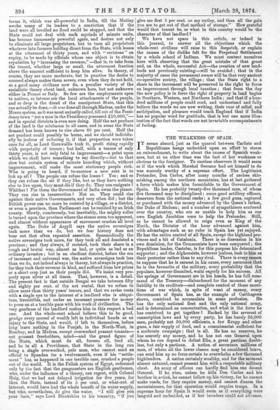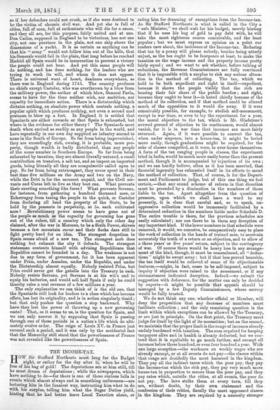THE WEAKNESS OF SPAIN.
IT seems absurd, just as the quarrel between Oarlists and Republicans hangs undecided upon an effort to storm an entrenchment, to write about the causes of Spanish weak- ness, but at no other time was the fact of her weakness so obvious to the foreigner. To careless observers it would seem as if the work which Marshal Serrano had set himself to do was scarcely worthy of a supreme effort. The Legitimist, Pretender, Don Carlos, after many months of useless skir- mishing among the northern mountains, has at last gathered a force which makes him formidable to the Government of Spain. He has probably twenty-five thousand men, of whom five thousand may be disciplined ; some good artillery officers, deserters from the national ranks ; a few good guns, captured or purchased with the money advanced by the Queen's father, the Duke of Modena ; and a number of sympathisers scattered over the country, who are as unable to help him as our own English Jacobites were to help the Pretender. Still, as he cannot be allowed to reign even as King of the North, the Dictator of the hour advanced against him, with advantages such as no ruler in Spain has yet enjoyed. He has the entire control of all Spain, except the highland pro- vinces and a bit of Catalonia. There is no dissension in his own dominion, for the Communists have been conquered ; the Republican leader, Castelar, is for this purpose his determined supporter ; and the Alphonsists, however jealous, look to him as their protector rather than to any rival. There is every reason to suppose that he is earnest in his cause, every assurance that he is the favourite of the military, every probability that the populace, however disunited, waits eagerly for his success. AU the springs of Government are in his hands, he has full com- mand of the Treasury—disburdened for the moment of any liability to its creditors—and complete control of those muni- tions of war which, in spite of want of money, every Government of Spain has, as the example of Carthagena shows, contrived to accumulate in some profusion. He has the only national fleet and the only national army, and is determined on concentration, and what is the force he has contrived to get together ? Backed by the severest of conscription laws and by every party, he has barely 36,000 men, probably not 30,000 efficients, a few Krupp and other guns, a fair supply of food, and a commissariat sufficient for a moderate campaign ; that is all. He has no reserves, he has scarcely any money, and he has not one General upon whom he can depend to defeat Elio, a great partizan doubt- less, but only a partizan. A nation of seventeen millions of men, of whom all the lower classes may be considered brave, can send him up no force certain to overwhelm a few thousand highlanders. A nation certainly wealthy, and for the moment almost untaxed, cannot present him with a respectable military chest. An army of officers can hardly find him one decent General. If he wins, unless he kills Don Carlos and his brother in action, he cannot follow up his victory, for he cannot make roads, for they require money, and cannot disarm the mountaineers, for that operation would require troops. In a supreme hour for Spain it would seem as if everything were languid and undecided, as if her invaders could not advance, as if her defenders could not crush, as if she were destined to be the victim of chronic civil war. And yet she is full of cities, full of men, full of enthusiasts who will die for a cause, and they all are, for this purpose, fairly united and at one. Don Carlos, supposed in England to be victorious, has not one city, of a y one province li is in a in plain, one anything an above a be that his " army " would not follow him out of the hills, that his Generals would fail in the plain, that long before he reached Madrid all Spain would be in insurrection to prevent a victory the people could not bear. And yet this same people will do nothing, and has done nothing, for the leaders who are trying to work its will, and whom it does not oppose. There is universal want of heart, deadness everywhere, as there was in England during 1745. The country produces no chiefs except Castelar, who was overthrown by a blow from the military power, the author of which blow, General Pavia, seems to have for the time neither wish, nor ambition, nor capacity for immediate action. There is a dictatorship which dictates nothing, an absolute power which controls nothing, a popular spirit which produces nothing, not even a second mad postman to blow up a fort. In England it is settled that Spaniards are either cowards or that Spain is exhausted, but where is the evidence for either theory ? The Spaniards meet death when excited as readily as any people in the world, and have repeatedly in our own day supplied an infantry second to none in the South of Europe. So far from being impoverished, they are exceedingly rich, owning, it is probable, more pro- perty, though wealth is badly distributed, than any people of the same number in Southern Europe. So far from being exhausted by taxation, they are almost literally untaxed, a small contribution on transfers, a salt tax, and an impost on imported goods, being literally all they are compulsorily called upon to pay. So far from being extravagant, they never spent in their best time five millions on the Army and two on the Navy, while the Debt is for the moment unpaid, and the Civil ser- vants and Curas left to live as they best can. What prevents their exerting something like force? What prevents Serrano, for instance, from gathering a hundred thousand men, or Echerragay from taxing the people to the quick, or Castelar from declaring all land the property of the State, to be held by the peasants in perpetuity, at 5s. each cultivated acre ? Revolutionary power seems to have gone out of the people as much as the capacity for governing has gone out of the rulers, till a country which only the other day claimed, after the war in Morocco, to be a Sixth Power, shivers because a few mountain curas and their flocks dare still to fight pretty hard for an idea. The strongest despotism in Spain seems afraid of a new tax. The strongest mob does nothing but exhaust the city it defends. The strongest statesman contents himself with advising Republicans that Republics cannot be founded in a day. The weakness is not due to any form of government, for it has been apparent under Prim, under Amadeo, under the Republic, and under the Dictatorship almost equally. Nobody resisted Prim, bat Prim could never get the gabelle into the Treasury in cash. Nobody resists Serrano, yet Serrano is at his wit's end to equip his batteries, and would sell half Spain if only he could thereby raise a real revenue of a few millions a year.
The only explanation we can think of is the old one, that the Spaniards still look for leaders to a class which has become effete, has lost its originality, and is in action singularly timid ; but that only pushes the question a step backward. Why have they lost the power of throwing up a new governing caste? That, as it seems to us, is the question for Spain, and we can only answer it by. supposing that Spain is passing through one of those periods in a nation's life which do ulti- mately evolve order. The reign of Louis XV.-in France just covered such a period, and it was only by the accidental fact that the Monarchy still stood that the powerlessness of France was not revealed like the powerlessness of Spain.



































 Previous page
Previous page